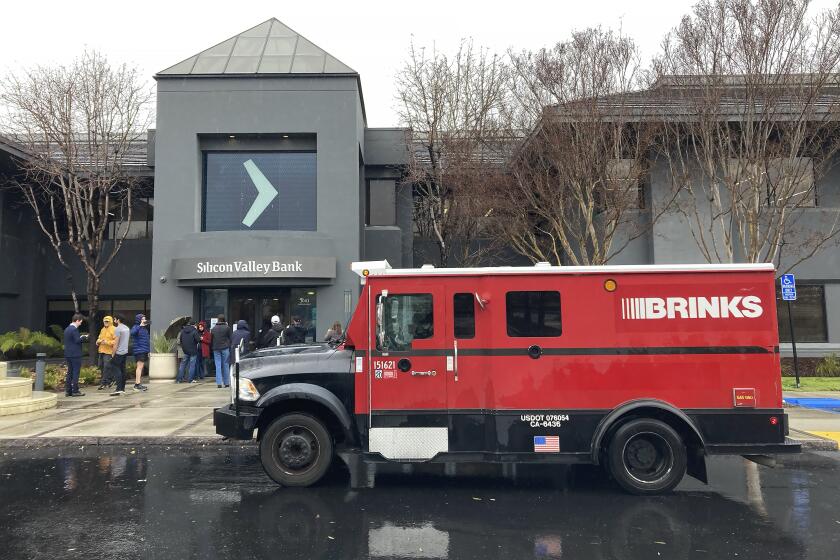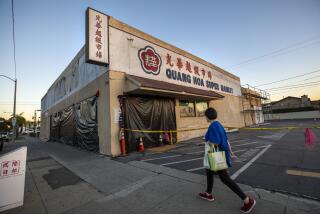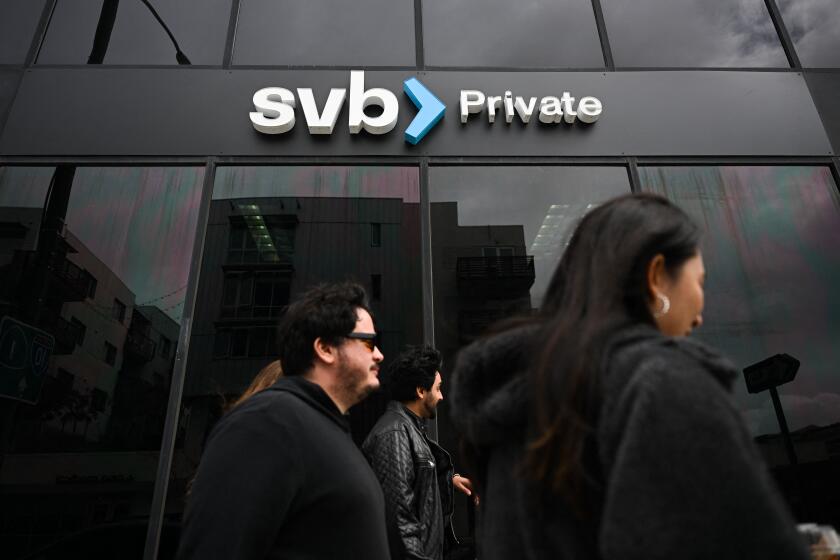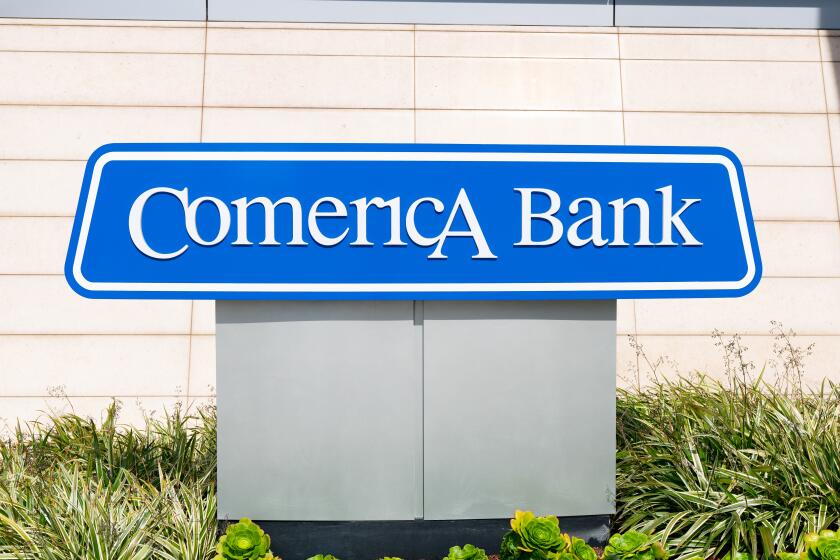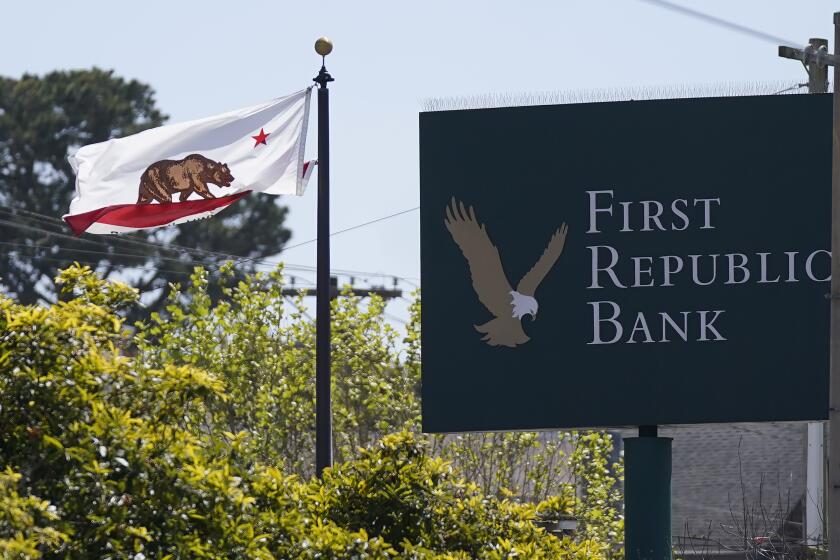Californians share how they felt when SVB collapsed: âPlease have mercy on usâ
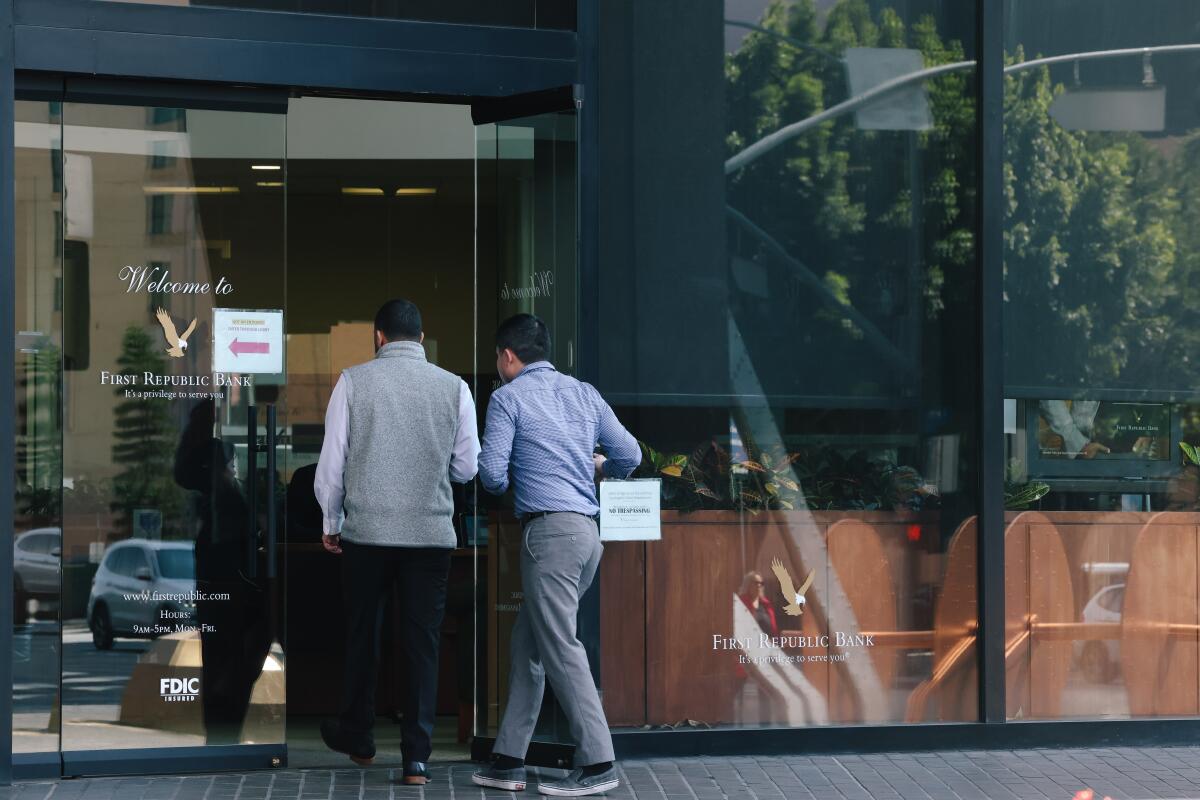
Locked out of her three accounts with failed Silicon Valley Bank, cookbook author Anna Vocino spent the weekend in a state of high anxiety, unsure about the future of her sauces and spices company.
âI spent most of Friday afternoon writing all of our creditors and saying, âHey, I know that we owe you money now, but hopefully everything will work out over the weekend,ââ she said. ââIf it doesnât, please have mercy on us.ââ
First thing Monday morning, Vocino was able to successfully log into the Silicon Valley Bank website and begin the process of closing her accounts. Sheâs moving her money to City National Bank.
âIâd just feel more comfortable somewhere else,â said the Solvang resident and owner of Eat Happy Kitchen.
Many other small business owners felt the same after the Federal Deposit Insurance Corp. seized the Santa Clara, Calif., bank Friday, followed by the Sunday takeover by state regulators of New Yorkâs Signature Bank.
Monday became a day of massive money moving and account closings after what one winemaker deemed a âcrisis purgatoryâ over the weekend, with account holders panicking that they wouldnât be able to access their money easily or quickly. Customers flooded Silicon Valley Bankâs website en masse while others rushed to branch locations of other vulnerable banks.
The financial scramble came despite reassurances from President Biden, who told Americans that moves by the U.S. Treasury, the Federal Reserve Bank and the FDIC will ensure âthe banking system is safe. Your deposits will be there when you need them.â
Silicon Valley Bank failed late last week, prompting fears of wider upheaval. Hereâs what you should know about the collapse and what comes next.
âI thought my business might be over, and I was angry,â said Anthony Coombs, chief executive of Santa Monica undergarments company Splendies. He called the previous 48 hours âabsolute chaosâ and said he wired 80% of his companyâs funds out of Silicon Valley Bank.
âThis was not making a stupid investment; this was not bad planning â this was the companyâs money in a bank where it is supposed to be safe,â he said.
Before Coombs learned whether the wire had gone through on Monday, he had tallied up his savings, prepared to use it to meet payroll for his 13 employees, and reached out to vendors, who told him that payments due within the next two weeks could be spread out to the next two months.
Many startup founders spent the weekend racing to figure out ways to make ends meet for their businesses.
Lauren Wang, who runs sustainable period product company Flex, was locked out of her companyâs money at Silicon Valley Bank on Friday. The next day, she drove to a Chase bank in Calabasas to open a business account and wired half of her familyâs liquid savings into it to make payroll for Flexâs 30 employees by Monday.
Financial turmoil has some people wondering if a systemic problem is putting all banks in peril, as in the Great Recession. Experts say that isnât the case.
It was âtake action first to protect our employees and figure it out later,â Wang said. âWe had no idea what was going to happen with the bank.â
For people who used Silicon Valley Bank as their primary source of banking, the collapse served as a lesson in diversification. King Alandy Dy, founder of San Francisco artificial intelligence logistics company Expedock, spent Friday waiting in line at Chase and Wells Fargo locations in Piedmont to set up new accounts â along with several other startup owners doing the same.
On Monday, he wired his money out of Silicon Valley Bank. âIâm just trying to have a decent spread,â he said of his new banking strategy.
Tegan Passalacqua of Sandlands Vineyards in Napa found out about last weekâs bank failure from his boss, who âcalled me and said, âI hope you donât have any money in Silicon Valley Bank,â and I was like, âIâve got all my money in Silicon Valley Bank.ââ
Passalacqua has banked with the financial institution for 11 years and has more than half a million dollars across two accounts, which he uses to pay for business expenses such as farming contractors, glass and cork makers, and shipping services.
âI didnât have much wiggle room on my balance sheet,â he said. âThere are plenty of people who were saying, âItâs going to be fine at the end of the day,â but you donât know until you have access to it.â
The failure of one of the tech industryâs central institutions could leave countless companies unable to pay their employees in the coming weeks.
Things were generally smooth on Monday after last weekâs bank run frenzy, but there were still hiccups.
Shortly before noon, Isa Watson, founder of social media startup Squad, said the company was still unable to get into its Silicon Valley Bank account and kept encountering error messages.
âItâs definitely another day of scrambling,â she said.
Her company is switching to Chase and hoped to have those new accounts set up by the end of the day. But until its Silicon Valley Bank funds are accessible, Watson is on the hook for Squadâs expenses. She began receiving payment failure notices on the companyâs Silicon Valley Bank credit cards on Saturday and has been paying the bills with her personal cards.
âI run a software company, we are in the consumer social space, we have a tech app and audio app,â she said. âI canât have my backend database go out because it wasnât paid.â
Watson said the sudden collapse of Silicon Valley Bank, which serviced more than half of all venture-backed tech startups in the country, had left founders ârethinking how we approach banking.â
Going forward, startups will have to take âmore of a front-row seat and strategy to how we bank,â she said, âwhich is just not something that we thought about with as much intentionality before.â
The fallout from Silicon Valley Bank has spread to other financial institutions, with First Republic Bank shares plummeting 62% on Monday despite assurances from the San Francisco-based bank that funding from the Federal Reserve and JPMorgan Chase had shored up its finances.
A First Republic branch in Studio City was filled Monday with customers. One said he had arrived at 9:30 a.m. to withdraw $340,000 and wire it to Bank of America.
âThey told me it would take half an hour,â he said. âNow itâs one oâclock, and we still donât have the money. They now tell me three oâclock. Iâm a little bit worried.â
A First Republic employee tried to reassure him, saying, âItâs a busy day so itâs taking a little longer.â
Another customer said he had decided to withdraw a $200,000 certificate of deposit to get down to the FDIC-insured limit of $250,000. He said he was worried about the bank failing and had decided to pay a $4,000 penalty to withdraw the CD early.
As customers hurried to move their money Monday, vendors watching from the sidelines said they hoped the turmoil wouldnât trickle down to their businesses.
Besides being a major bank for tech startups, Silicon Valley Bank was also deep in the wine industry. For days, grape growers have been trying to figure out which of their winery clients used Silicon Valley Bank, fearing that they might not get paid on time, said Jennifer Thomson, owner of Thomson Vineyards, a contract grower in Napa.
âThe first thing that tech dudes who own a winery donât pay is the grower,â she said.
Times staff writers Terry Castleman, Daniel Miller, Russ Mitchell and Melody Petersen contributed to this report.
More to Read
Inside the business of entertainment
The Wide Shot brings you news, analysis and insights on everything from streaming wars to production â and what it all means for the future.
You may occasionally receive promotional content from the Los Angeles Times.

